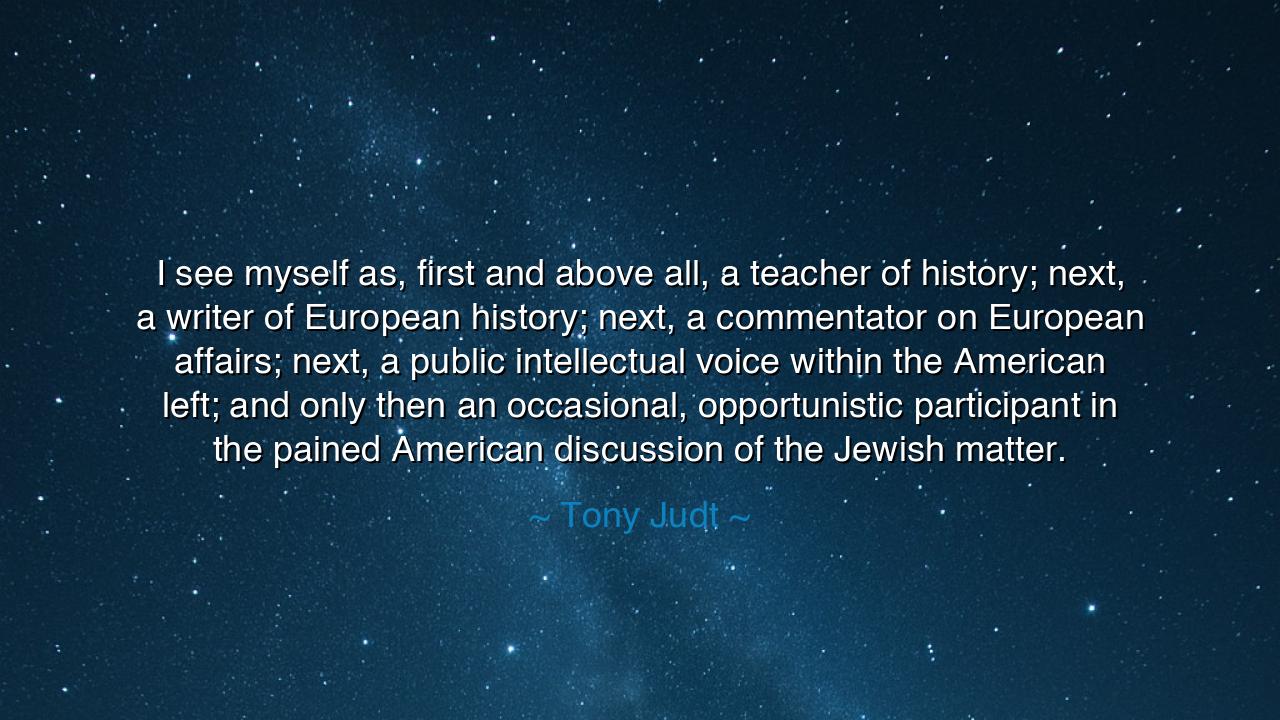
I see myself as, first and above all, a teacher of history;
I see myself as, first and above all, a teacher of history; next, a writer of European history; next, a commentator on European affairs; next, a public intellectual voice within the American left; and only then an occasional, opportunistic participant in the pained American discussion of the Jewish matter.






Tony Judt, the historian and thinker, once declared with clarity and humility: “I see myself as, first and above all, a teacher of history; next, a writer of European history; next, a commentator on European affairs; next, a public intellectual voice within the American left; and only then an occasional, opportunistic participant in the pained American discussion of the Jewish matter.” In this declaration lies the order of a man’s vocation, carefully set forth as one sets stones in a path. It is not the boast of ambition, but the confession of a life arranged by conscience and duty.
The origin of this statement is rooted in Judt’s life as a scholar who was born in London, trained in the halls of Cambridge and Paris, and later became a towering voice at New York University. He lived as one who carried the weight of Europe’s history in his heart: wars, revolutions, the Holocaust, the rise and fall of nations. To him, history was not mere record, but living truth, a lantern by which to navigate the present. By calling himself first a teacher of history, he revealed that his highest loyalty was not to fame nor to ideology, but to the task of opening the eyes of others to the past, so they might walk more wisely into the future.
This ordering of roles reflects the discipline of the ancients. Think of Cicero, who considered himself first a servant of the Republic, next a philosopher, and only after these a voice against tyranny. Or of Marcus Aurelius, who wrote that he was first a man of duty, then an emperor, and only after that a thinker in solitude. Judt, in this same spirit, reminds us that greatness is not in scattering oneself across all pursuits at once, but in arranging them by weight and purpose. The foundation of his life was teaching, and everything else flowed from that source.
The meaning of his words is also profoundly moral. He knew the temptation of intellectuals: to pursue fame, to chase politics, to wield influence in controversies of the day. But he resisted such temptations by reminding himself—and us—that one must not neglect the first duty for the sake of the later. The commentator must never forget the teacher within; the public voice must never eclipse the patient work of explaining and guiding. His hierarchy is a call to integrity, a warning that one who forgets his primary vocation risks becoming rootless, tossed by the winds of opinion.
Even in his acknowledgment of being an occasional participant in the Jewish question, Judt showed restraint and humility. Though himself Jewish, he did not seek to become the loudest voice in that painful debate. He spoke when conscience demanded, but never made it the sum of his identity. This shows us the mark of wisdom: to know when to speak, and when to step back; to refuse the easy path of defining oneself by controversy, and instead to ground oneself in deeper, enduring roles.
The lesson here is luminous: order your life by your truest calling. Do not let noise or opportunity pull you from your foundation. If you are a teacher, then teach first. If you are a healer, then heal first. If you are a builder, then build first. Only from this rootedness can you rightly extend into other roles—writer, commentator, public voice—without losing your center. To forget this order is to become fragmented; to remember it is to live whole.
Practically, this means: take time to name your roles, and place them in their proper order. Write them down as Judt did, and remind yourself daily of the first thing you must be faithful to. Do not despise the quieter roles, for they are the soil from which the louder ones grow. In this way, you will not be consumed by controversy, nor lost in ambition, but will live as a tree planted deeply, with branches wide, and fruit that nourishes generations.
Thus, Judt’s words endure as a testament: he was first a teacher of history, and everything else was born from that sacred task. Let us, too, learn to order our lives with such wisdom, that our work may be not only loud, but lasting—not only brilliant, but rooted in truth. For the world has no shortage of voices, but it starves for voices that are anchored, disciplined, and faithful to their first calling.






AAdministratorAdministrator
Welcome, honored guests. Please leave a comment, we will respond soon